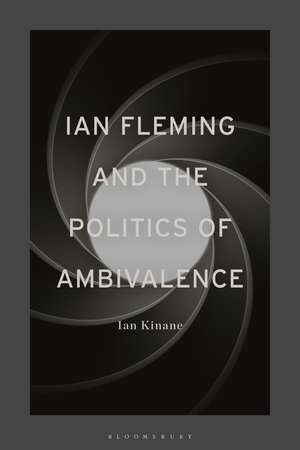Ian Fleming and the Politics of Ambivalence
Autor Dr Ian Kinaneen Limba Engleză Paperback – 19 oct 2022
| Toate formatele și edițiile | Preț | Express |
|---|---|---|
| Paperback (1) | 197.34 lei 43-57 zile | +72.52 lei 5-11 zile |
| Bloomsbury Publishing – 19 oct 2022 | 197.34 lei 43-57 zile | +72.52 lei 5-11 zile |
| Hardback (1) | 568.64 lei 43-57 zile | |
| Bloomsbury Publishing – 5 mai 2021 | 568.64 lei 43-57 zile |
Preț: 197.34 lei
Preț vechi: 257.63 lei
-23% Nou
Puncte Express: 296
Preț estimativ în valută:
37.76€ • 39.20$ • 31.49£
37.76€ • 39.20$ • 31.49£
Carte tipărită la comandă
Livrare economică 24 martie-07 aprilie
Livrare express 14-20 februarie pentru 82.51 lei
Preluare comenzi: 021 569.72.76
Specificații
ISBN-13: 9781350235380
ISBN-10: 1350235385
Pagini: 224
Dimensiuni: 156 x 234 x 16 mm
Greutate: 0.32 kg
Editura: Bloomsbury Publishing
Colecția Bloomsbury Academic
Locul publicării:London, United Kingdom
ISBN-10: 1350235385
Pagini: 224
Dimensiuni: 156 x 234 x 16 mm
Greutate: 0.32 kg
Editura: Bloomsbury Publishing
Colecția Bloomsbury Academic
Locul publicării:London, United Kingdom
Caracteristici
Draws together a number of interrelated, cross-disciplinary approaches to the study of Ian Fleming and James Bond from literary studies, film studies and cultural studies to race and cultural studies and postcolonial studies
Notă biografică
Ian Kinane is Senior Lecturer in English Literature at the University of Roehampton, UK, where he convenes the MA in Popular Literature and Culture. He is the author and editor of a number of books, including Isn't it Ironic?: Irony in Contemporary Popular Culture (2021), Didactics and the Modern Robinsonade (2019), Theorising Literary Islands (2016) and (with Downey and Parker) Landscapes of Liminality: Between Space and Place (2016). He is also the General Editor of the International Journal of James Bond Studies.
Cuprins
Acknowledgements Introduction: Ian Fleming and the Politics of Ambivalence; or, From Jamaica with Love? 1. Imagined Identities and the Black Body Politic in Live and Let Die 2. Invasion, Animality and Bodily Transgressions in Dr. No3. Mobility, Memory, and Touristic Modernity in The Man with the Golden Gun 4. After Fleming: Jamaica on ScreenBibliographyIndex
Recenzii
Ian Kinane offers a thoughtful and thorough consideration of how Ian Fleming, through his Jamaican-set James Bond novels, registered and (re)imagined shifting British-Jamaican relations. With chapters dedicated to Live and Let Die (1954), Dr No (1958), and The Man with the Golden Gun (1965), Kinane fleshes out, in fascinating detail, Fleming's "politics of ambivalence" towards the decolonization and ultimate independence of Jamaica.
Challenging simplistic readings of the representational politics in Ian Fleming's works, this excellent book offers a nuanced analysis of racial discourse, colonial ideology and the place Jamaica occupies within the Empire and the British imagination. While the rigorous research underpinning this original study is a timely - and much needed - addition to the growing field of Bond studies, Ian Kinane's engaging investigation will inspire anyone interested in delving deeper into the complex politics of James Bond.
Ian Kinane's Ian Fleming and the Politics of Ambivalence is an intriguing study of the role of Jamaica in Flemings' James Bond novels. It offers a reconsideration of the three Jamaica-based Bond novels - Live and Let Die (1954), Dr. No (1958) and The Man with the Golden Gun (1965) - as works that showcase Fleming's own, often conflicted, concern for British-Jamaican relations, rather than novels that merely uphold colonial discourse. As such, Ian Fleming and the Politics of Ambivalence fills a void in the existing criticism on Fleming's work, and is a must-read for all scholars working on James Bond, empire, and cultural politics.
Ian Kinane's in-depth comparative analysis of the Bond novels set in Jamaica makes significant contributions to scholarship. His work not only reminds us that Jamaica is where Bond is "born" in 1953, "resurrected" in 1958, and "renewed" in the final novel published in 1965. By tracing shifts in Fleming's depictions of Jamaica, its people, and its colonial administrators, Kinane illuminates the fraught complexity of Fleming's sentiments about Britishness in a modern world marked the empire's decline.
Engaging and provocative... [Kinane's] critical focus enables him to formulate first-rate readings of the global and racial politics of Fleming's fiction.
Challenging simplistic readings of the representational politics in Ian Fleming's works, this excellent book offers a nuanced analysis of racial discourse, colonial ideology and the place Jamaica occupies within the Empire and the British imagination. While the rigorous research underpinning this original study is a timely - and much needed - addition to the growing field of Bond studies, Ian Kinane's engaging investigation will inspire anyone interested in delving deeper into the complex politics of James Bond.
Ian Kinane's Ian Fleming and the Politics of Ambivalence is an intriguing study of the role of Jamaica in Flemings' James Bond novels. It offers a reconsideration of the three Jamaica-based Bond novels - Live and Let Die (1954), Dr. No (1958) and The Man with the Golden Gun (1965) - as works that showcase Fleming's own, often conflicted, concern for British-Jamaican relations, rather than novels that merely uphold colonial discourse. As such, Ian Fleming and the Politics of Ambivalence fills a void in the existing criticism on Fleming's work, and is a must-read for all scholars working on James Bond, empire, and cultural politics.
Ian Kinane's in-depth comparative analysis of the Bond novels set in Jamaica makes significant contributions to scholarship. His work not only reminds us that Jamaica is where Bond is "born" in 1953, "resurrected" in 1958, and "renewed" in the final novel published in 1965. By tracing shifts in Fleming's depictions of Jamaica, its people, and its colonial administrators, Kinane illuminates the fraught complexity of Fleming's sentiments about Britishness in a modern world marked the empire's decline.
Engaging and provocative... [Kinane's] critical focus enables him to formulate first-rate readings of the global and racial politics of Fleming's fiction.
